Air Source Heat Pump Grant
Heating your home isn’t cheap these days. Gas and oil prices keep creeping up, and many households are stuck with old, inefficient boilers that burn through money as quickly as they burn fuel. That’s exactly why the government is backing renewable alternatives and why schemes like ECO4 and the Boiler Upgrade Scheme (BUS) are helping people install air source heat pumps at little to no cost.
So, what does that mean for you? In short: a chance to swap your outdated heating system for one that’s cleaner, cheaper to run, and fully future-proof.
Not sure if you’d qualify? That’s exactly what we’re here for. A quick call or online check is all it takes to find out and if you’re eligible, we’ll guide you through the process step by step.
Apply Now For A Free Air Source Heat Pump Grant
Fill out the form below to take advantage of the free air source heat pump grant.
By submitting this form, you consent to us contacting you by phone, SMS, or email regarding your ECO4 Free Boiler Grant application. We will not use your details for unrelated marketing. See our Privacy Policy for more. You can opt out at any time.

3 Step Eligibility Process

Complete Online Form
Fill out our quick online form to apply for your air source heat pump grant.

Get a Survey
Schedule a free home survey to assess your current heating system and energy needs

Get a Air Source Heat Pump Grant
Receive a grant for a brand new, energy-efficient air source heat pump at no cost.
Who Qualifies for an Air Source Heat Pump Grant?
Not everyone is sure where they stand when it comes to grants and the rules can look complicated on paper. The good news is there are several different routes to funding, so even if you don’t meet one set of criteria, you may still qualify under another.
ECO4 Scheme
ECO4 is aimed at households on lower incomes or means-tested benefits. If your property has an EPC rating of D–G, and you’re currently relying on an inefficient or fossil fuel heating system, you could qualify for full funding. That means the entire installation is covered: surveys, parts, labour, and aftercare.
Qualifying benefits include:
- Universal Credit (UC)
- Pension Credit
- Income Support
- Income-based Jobseeker’s Allowance (JSA)
- Income-based Employment & Support Allowance (ESA)
- Working Tax Credit
- Child Tax Credit
Many households assume their income is “too low” to get help, when in reality, ECO4 was designed specifically for that group.
Boiler Upgrade Scheme (BUS)
For those who don’t receive benefits, the BUS is often the best route. It’s open to most homeowners in England and Wales and provides a £7,500 contribution towards installing a heat pump.
The main condition is that you’re replacing a fossil fuel system (like gas, oil, or LPG). You also need to meet basic property suitability checks, which are confirmed during a free home survey.
Local Authority Flex (LA Flex)
If you’re just outside the strict benefit criteria, there’s also LA Flex. Local councils have discretion to approve applications for households in vulnerable situations or with slightly higher incomes. It’s worth checking, many families qualify this way without realising.
Air Source Heat Pump Grants Comparison
| Feature | ECO4 | BUS |
|---|---|---|
| Funding | Up to 100% (fully funded) | £7,500 contribution |
| Who Qualifies | Low-income / benefits households | Most homeowners (England & Wales) |
| Property EPC | D–G rating | Typically any, but must be suitable |
| Heating System | Replacing inefficient/fossil fuel | Must replace fossil fuel heating |
| Cost to You | Often nothing | Small top-up payment may apply |
Where Do You Fit?
You don’t need to know the ins and outs of every scheme, that’s where we come in. At Free Energy Savings, we check which pathway you qualify for and guide you through the process, with minimal paperwork on your end.
What Is an Air Source Heat Pump Grant?
When people hear the word “grant,” they often wonder if it’s too good to be true. In this case, it isn’t. Air source heat pump grants are genuine, government-backed funding schemes designed to help households switch from fossil fuel heating to cleaner, more efficient systems.
There are two main routes to funding:
- ECO4 Scheme – This is aimed at households on means-tested benefits or lower incomes. If you qualify, ECO4 can cover the entire cost of installing a heat pump, including surveys, parts, labour, and aftercare. For many families, this makes the switch completely free.
- Boiler Upgrade Scheme (BUS) – Open to most homeowners across England and Wales, the BUS offers a £7,500 grant towards installation costs. While it won’t always make the system completely free, it covers a large share, leaving you with a much smaller contribution than paying outright.
Both schemes exist because the government has set a legally binding target to reach Net Zero emissions by 2050. Heating is one of the UK’s biggest sources of carbon, and heat pumps are one of the most effective ways to reduce it, while also protecting households from rising gas and oil prices.
Think of the grant as the government’s way of nudging us all in the right direction: making it possible to replace old boilers with a system that’s cheaper to run, better for the planet, and built to last 15–20 years.
If you’re unsure which route applies to you, that’s normal. ECO4 and BUS each have their own rules, but the good news is you don’t need to figure them out alone. At Free Energy Savings, we’ll check which scheme you qualify for and handle the application from start to finish.
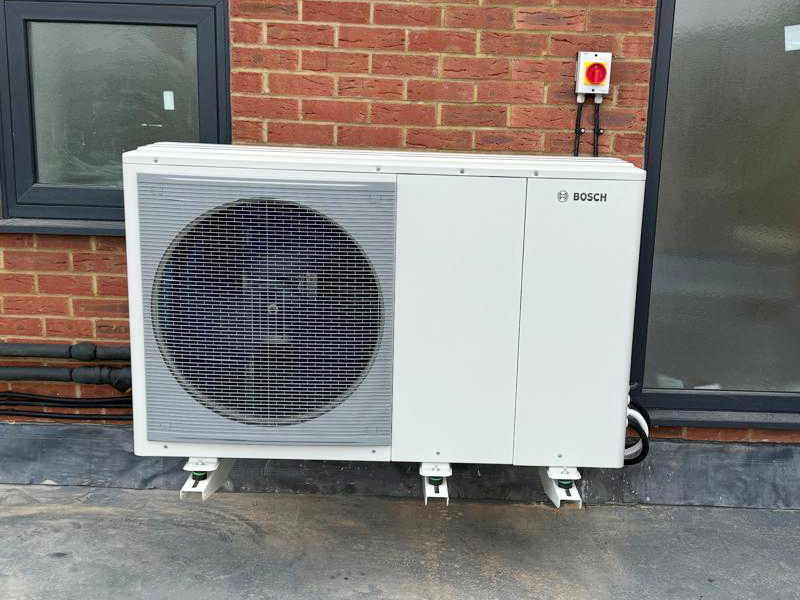
Why Air Source Heat Pumps Are Important
It’s one thing to know grants exist, but why choose a heat pump in the first place? The short answer: they can make a big difference to your bills, your home, and even the wider environment.
For most households, heating is the single biggest energy cost. An air source heat pump can cut those costs by 40–60%, depending on your property and what system you’re replacing. For example, families switching from oil or old electric heating often see the largest savings.
But there’s more to it than just cheaper bills:
- Comfort year-round – Heat pumps don’t just provide heating. They can also work in reverse to deliver cooling in summer.
- Better EPC rating – By installing one, you can boost your home’s energy performance certificate (EPC). That means higher property value and less hassle if you plan to rent or sell.
- Long lifespan – Most systems last 15–20 years with only minimal maintenance.
- Lower emissions – On average, a heat pump produces up to 70% less CO₂ than a gas boiler.
You might be wondering whether they work with your existing setup. The good news is that modern air-to-water heat pumps are compatible with radiators and underfloor heating. A proper survey will show exactly what’s needed, but in most cases it’s far less disruptive than people expect.
The bigger picture matters too. Every household that moves from fossil fuels to a renewable system is part of the UK’s energy transition. And while Net Zero 2050 might feel like a distant government target, the truth is, it starts one property at a time.
So, for your home, the benefit is clear: lower bills, year-round comfort, and future-proof heating. For the country, it’s a step toward a cleaner energy system.
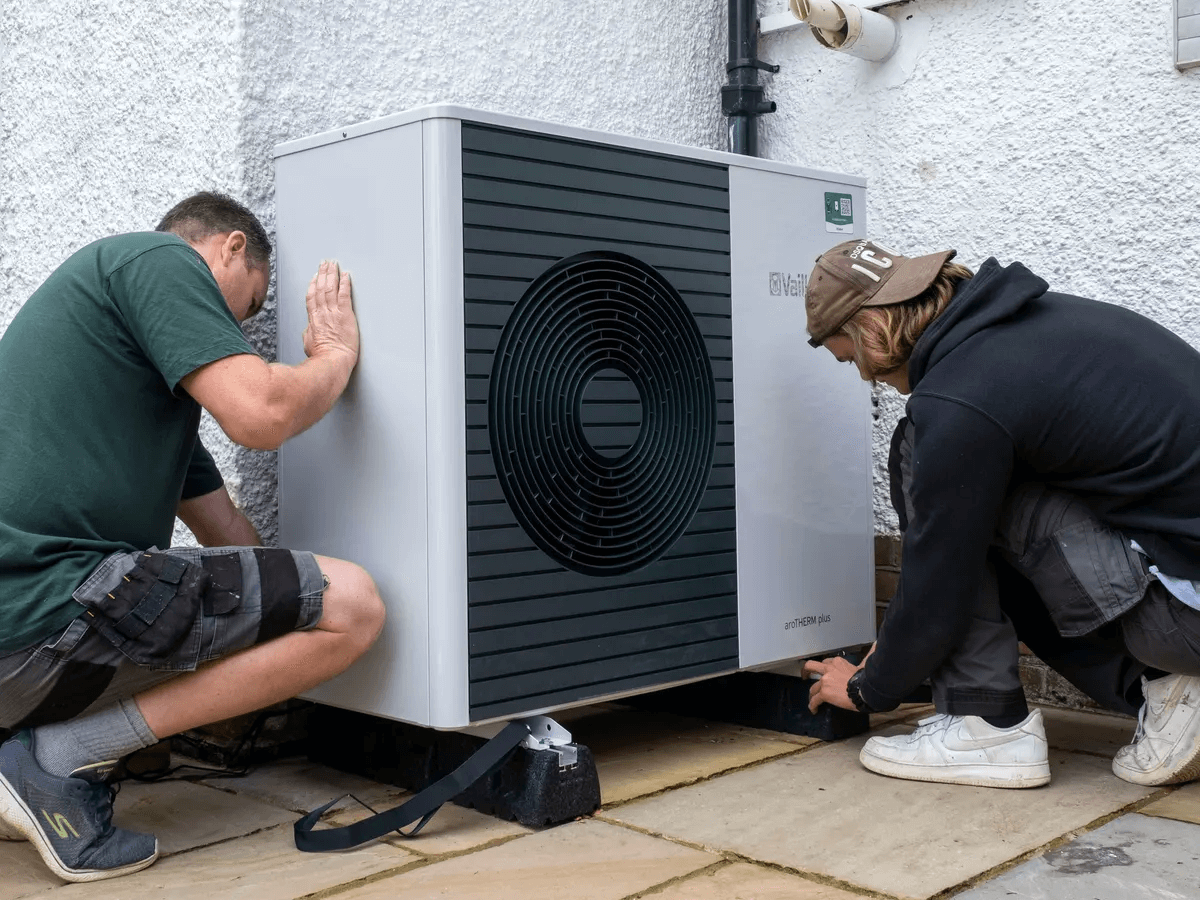
How Do Air Source Heat Pumps Work?
At first glance, heat pumps can sound complicated. In reality, the idea is pretty straightforward, they take heat from the air outside your home and use it to warm your rooms and hot water.
Here’s the simple version:
- The pump absorbs heat from the outside air (even when it’s cold).
- That heat is compressed, which raises its temperature.
- The system then transfers the heat into your home’s heating and hot water system.
It’s basically the reverse of how a fridge works, instead of pushing warm air out, it pulls it in and makes it useful.
The big advantage is efficiency. For every unit of electricity a heat pump uses, it can generate three to four units of heat. That’s why they’re considered far more efficient than traditional boilers, which can only ever be less than 100% efficient.
A common worry is: “Will it actually work in a UK winter?” The answer is yes. Modern models are designed for cold climates and can operate reliably even when temperatures dip below freezing. Scandinavian countries with much harsher winters than ours have been using them for decades.
As for upkeep, heat pumps are relatively low-maintenance. Most just need a yearly check, much like servicing a boiler. No constant repairs or fiddly tasks.
So while the technology might sound modern, it’s actually proven, simple, and built to last. And once it’s in place, you don’t have to think about it much, apart from noticing your bills are lower.
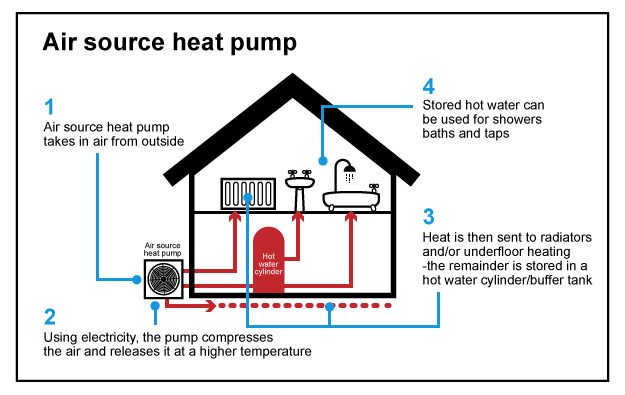
How Much Can You Save With a Heat Pump?
When people first hear about heat pumps, the big question is usually: “But will it actually save me money?” The answer depends on your property and what you’re replacing, but in most cases, the savings are significant.
Here’s what the numbers typically look like:
- Detached home – £900 to £1,200 a year
- Semi-detached home – £600 to £800 a year
- Terraced home – £400 to £600 a year
Those figures are based on averages, but they give a good idea of the scale. Households currently running on oil or old electric heating usually see the biggest drops, while those moving from mains gas will still notice steady long-term savings.
It’s not just about today’s bills, either. Gas prices have been volatile in recent years, and there’s no guarantee they’ll settle down. A heat pump gives you more predictable running costs, since it uses electricity and is up to three times more efficient at turning that electricity into usable heat.
Add in the fact that many households get their installation either fully funded (ECO4) or heavily subsidised (£7,500 via BUS), and the numbers become even more attractive. Instead of sinking more money into an inefficient boiler, you’re investing in a system that’s cheaper to run and designed to last 15–20 years.
So the question isn’t really whether a heat pump saves money, it’s how much you stand to save based on your home.
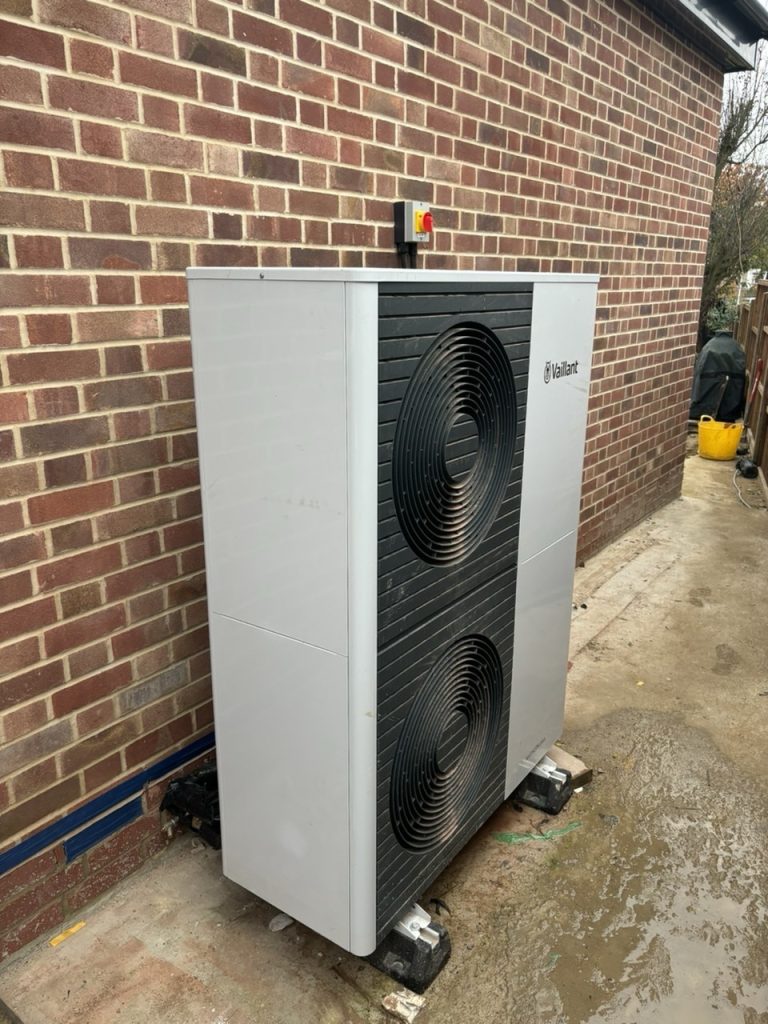
What’s Included in the Heat Pump Grant?
One of the biggest worries people have is whether there are hidden costs tucked away somewhere. With government-backed schemes, the process is clear and most of what you need is included.
Here’s what you can expect when you qualify:
- Free home energy assessment – A qualified surveyor visits your property to check suitability and confirm the right type of heat pump.
- Full installation – The system itself, plus all labour, pipework, and commissioning.
- Certified installers only – All work is carried out by government-approved, MCS-certified engineers.
- Warranties & aftercare – Once installed, your system comes with warranty cover and support if needed.
The exact level of funding depends on which scheme you qualify for:
- ECO4 Scheme – If you’re eligible, the grant usually covers 100% of costs. That means no bills for the installation at all.
- Boiler Upgrade Scheme (BUS) – Provides a £7,500 contribution, so there may be a top-up to pay. For most homeowners, this reduces the cost to a fraction of what it would be without support.
In both cases, there’s no cutting corners. You’re not left with a half-finished job or cheap equipment. The grants are designed to give households proper, long-term heating solutions that meet strict standards.
So when we say “grant,” we mean the whole package: survey, system, installation, and aftercare.
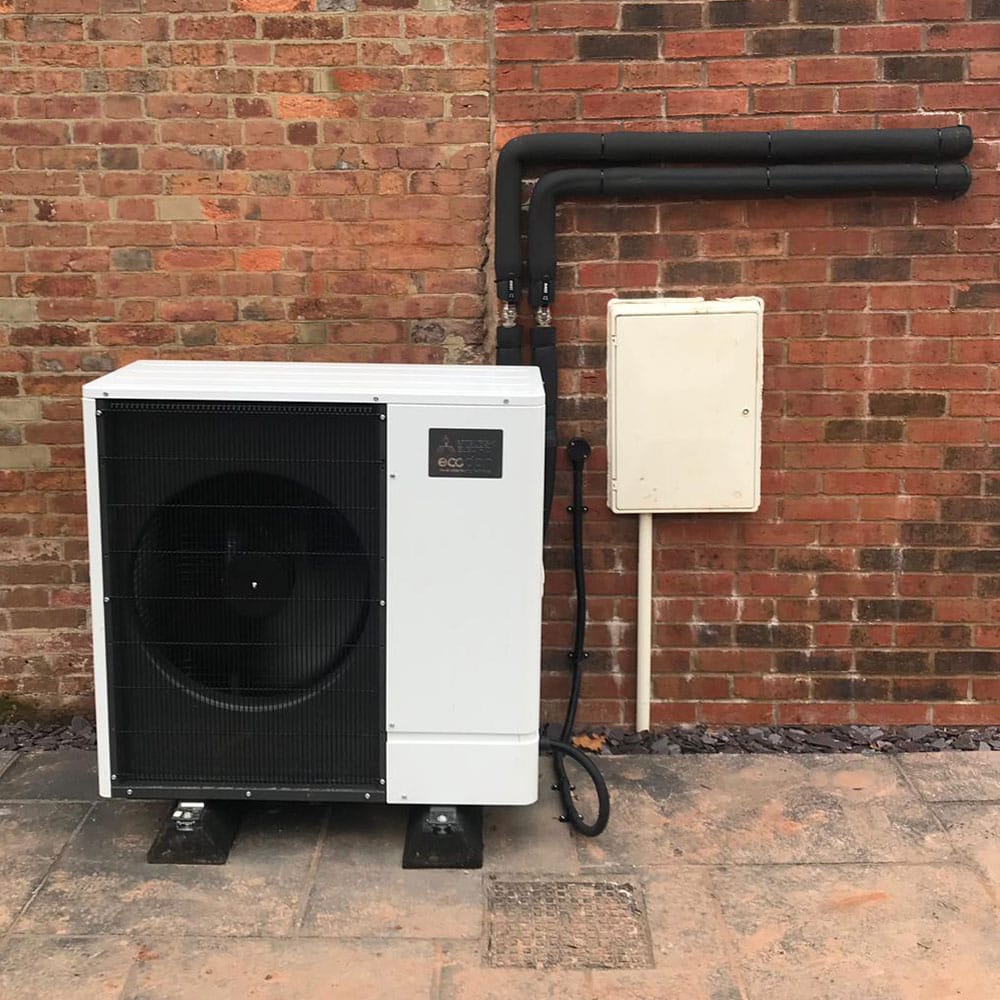

Types of Heat Pumps
Not all heat pumps are the same and which one suits your home depends on how your property is set up. The free survey helps confirm the best choice, but here are the two main types you’ll come across:
Air-to-Water Heat Pumps
This is the most common type in the UK. It works by heating water, which then runs through your radiators, underfloor heating, and hot water tank. For most households, especially those already using central heating, this is the straightforward replacement for a boiler.
Best for: Homes with radiators or underfloor heating, where you also want hot water supplied.
Air-to-Air Heat Pumps
Instead of heating water, these systems provide warm (or cool) air directly into your rooms. They work a bit like reversible air conditioning, great for year-round comfort, but they don’t supply hot water.
Best for: Homes that need a flexible heating/cooling solution, or properties where installing a water-based system isn’t practical.
Most households applying for grants will end up with an air-to-water system, since it covers both heating and hot water needs. But it’s not something you have to decide on your own. The survey will show exactly what works for your property, and the funding is flexible enough to support both options.
The key point is: whichever type you get, both are designed to be efficient, reliable, and far cheaper to run than old fossil fuel systems.
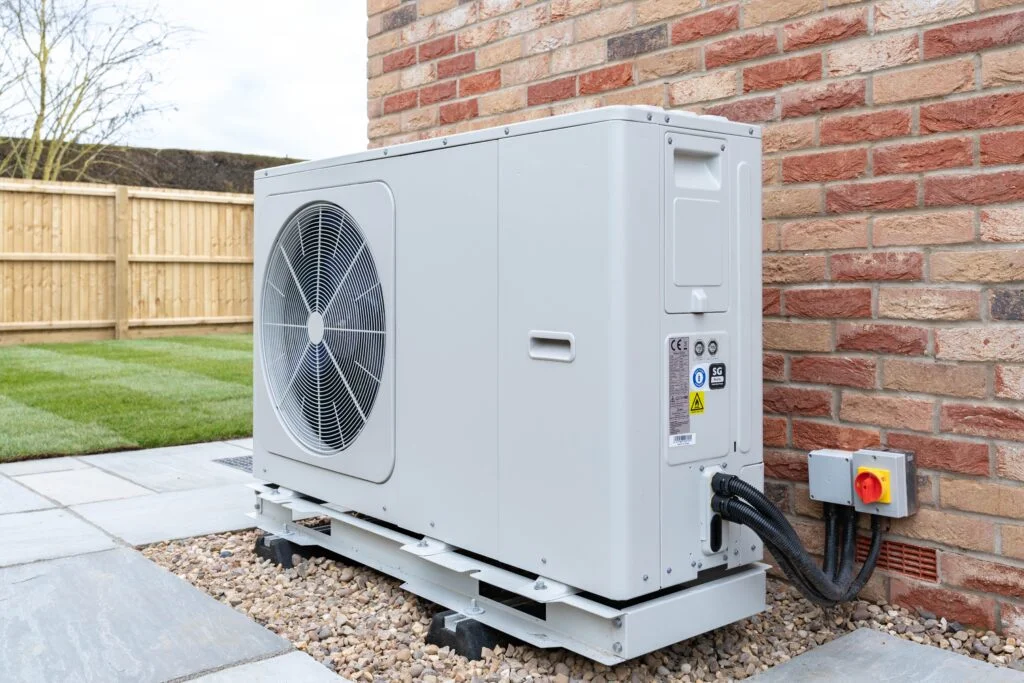
Can I Get a Heat Pump Grant If I Already Have Heating Installed?
Yes, in fact, that’s exactly what the schemes are designed for. Both ECO4 and the Boiler Upgrade Scheme exist to help households replace older, less efficient systems with cleaner, cheaper ones.
Here’s how it works in practice:
- ECO4 Scheme – If you’re on a low income or receiving certain benefits, you may qualify for full funding to replace an old gas, oil, coal, or electric system. Many households currently running expensive electric or oil heating see the biggest gains.
- Boiler Upgrade Scheme (BUS) – To qualify, you’ll need to be replacing a fossil fuel system (gas, oil, or LPG). A working boiler doesn’t exclude you, as long as it’s fossil fuel-based and you meet the property suitability checks.
Some homeowners worry that if their current boiler is “too new,” they won’t be eligible. But the key factor isn’t always age, it’s whether your property qualifies under the scheme rules. That’s why the free survey is so important.
So even if you already have heating installed, it’s well worth checking. For many households, upgrading through the grant schemes means swapping constant fuel costs for a system that’s designed to last 15–20 years with far lower running costs.
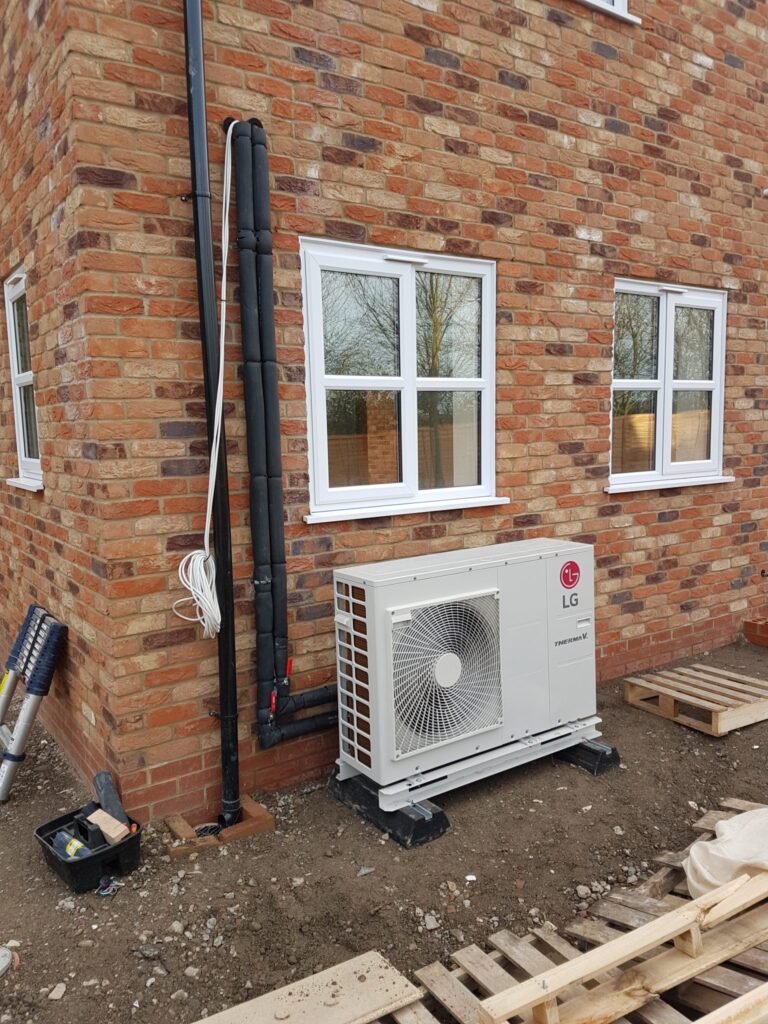
Our Application & Installation Process
One of the main reasons people put off applying for grants is the worry that it’ll be complicated or drag on for months. In reality, the process is straightforward and we handle most of it for you.
Here’s how it works:
Step 1: Eligibility check
Start with a quick call or online form. We’ll ask a few simple questions to see if your household qualifies.
Step 2: Free property survey
If you’re eligible, one of our qualified surveyors will visit your home. They’ll check your current heating, your EPC rating, and whether a heat pump is the right fit.
Step 3: Application submitted
We take care of all the paperwork and submit your application to the relevant scheme (ECO4, BUS, or LA Flex).
Step 4: Installation
An MCS-certified installer fits your new heat pump. This usually takes 2–4 days, depending on your property.
Step 5: Quality check
Once installed, the system is inspected to make sure everything meets the required standards.
Step 6: Aftercare & support
You’ll get warranty cover and ongoing support if you ever need it.
From start to finish, the process typically takes 3–6 weeks. And because we handle the admin and applications, your involvement is minimal. No confusing forms, no chasing contractors, just a smooth switch to renewable heating.
Why Choose Free Energy Savings?
There are plenty of companies talking about heat pumps and grants right now, but not all of them have the experience or structure to actually see your application through from start to finish. That’s where we’re different.
At Free Energy Savings, we specialise in government-backed energy schemes like ECO4 and the Boiler Upgrade Scheme. It’s what we do every day, and it means we know the rules, the paperwork, and the process inside out.
Here’s what that looks like in practice:
- Nationwide coverage – No matter where you are in the UK, we have trusted, MCS-certified installers ready to help.
- Fast-track applications – We handle the forms and communication with the scheme providers, so you don’t get stuck in admin limbo.
- Free, no-obligation survey – Checking eligibility costs nothing, and you can walk away if it’s not right for you.
- Certified quality – We only work with approved installers who meet strict government standards.
- End-to-end support – From the first call to aftercare and warranty, we’re with you the whole way.
Many homeowners come to us after putting it off for months, thinking the process would be a hassle. Once they see how simple it actually is, they often wish they’d applied sooner.
If you’re considering upgrading your heating, it helps to have a team that’s done it thousands of times before. That’s what we bring, not just knowledge, but reassurance that you’ll be looked after from start to finish.
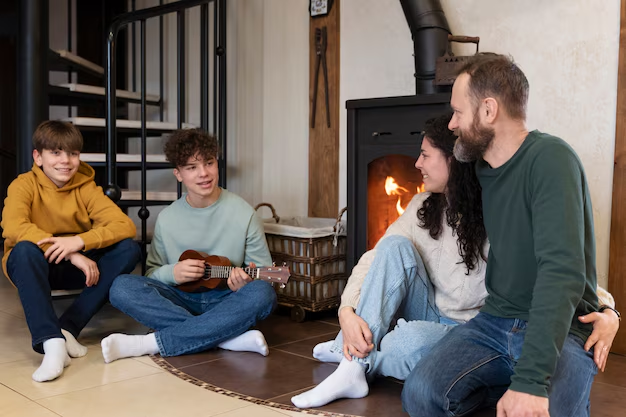
Ready to Apply for a Heat Pump Grant?
Switching to a heat pump isn’t just about saving money, it’s about making your home more efficient, more comfortable, and better prepared for the future. With government support through ECO4 and the Boiler Upgrade Scheme, households across the UK now have a clear route to renewable heating without facing huge upfront costs.
To recap, here’s what a grant-backed heat pump offers:
- Lower bills – savings of hundreds each year depending on your property.
- Cleaner heating – reduced carbon emissions and less reliance on fossil fuels.
- Long-lasting investment – systems designed to run for 15–20 years.
- Government funding – either full installation (ECO4) or a £7,500 contribution (BUS).
At Free Energy Savings, we make the process simple. From eligibility checks to installation and aftercare, our team manages everything. You won’t be left chasing paperwork or wondering what comes next.
If you’ve been thinking about renewable heating but assumed it was too expensive or complicated, now’s the time to take another look. The funding is real, the technology works, and thousands of households are already seeing the benefits.
Frequently Asked Questions
It can be. Under the ECO4 scheme, households on qualifying benefits often get 100% of costs covered, meaning no charge for installation. For others, the Boiler Upgrade Scheme (BUS) provides a £7,500 contribution, which usually covers the majority but may leave a smaller balance to pay.
Yes. The ECO4 scheme is aimed at households on lower incomes or benefits, but the BUS is open to most homeowners in England and Wales, no benefits required. There’s also LA Flex, where local councils can approve funding for households just outside strict benefit rules.
Yes. Tenants can apply with their landlord’s permission, and many private renters qualify under ECO4 if they meet the income and EPC requirements. Landlords can apply too, provided the property meets the scheme criteria.
Savings vary by property size and your current heating system:
Detached home – £900–£1,200 per year
Semi-detached – £600–£800 per year
Terraced – £400–£600 per year
Households switching from oil or electric heating often see the biggest drops.
The installation itself usually takes 2–4 days, depending on your property. From first enquiry to a working system, the whole process takes around 3–6 weeks.
That’s fine. Both schemes are designed to replace existing systems, whether it’s an old gas boiler, oil heating, or electric. The grant doesn’t require you to be without heating.
Homeowners qualify under both ECO4 and BUS. Tenants can apply too, but they’ll need landlord permission for the upgrade.
The easiest way is through a quick eligibility check with us. We’ll confirm whether you qualify for ECO4, BUS, or LA Flex and handle the application from there.
Yes. A heat pump is considered a major efficiency upgrade and usually improves a property’s Energy Performance Certificate (EPC) rating. That means better property value and easier compliance for landlords.
Yes. Many households combine heat pumps with solar panels or insulation upgrades for even bigger savings. In fact, ECO4 often funds multiple measures (like insulation plus a heat pump) to make homes more efficient overall.
Yes. Modern air source heat pumps are built for colder climates and work reliably even when it’s below freezing. Countries like Sweden and Norway, where winters are far harsher than the UK, have been using them for decades.
Most systems last 15–20 years with proper care, often longer than a traditional boiler.
They do make a sound, similar to an outdoor air conditioning unit. But modern models are much quieter than people expect and usually fade into the background.
In most cases, no. Heat pumps are considered permitted developments as long as certain conditions are met (like distance from property boundaries). Your installer will confirm this during the survey.

What Our Customers Have To Say
Read More Of Our Reviews On Trust Pilot
We’ve had some bad experiences with installers in the past, but Free Energy Savings was a breath of fresh air. They were helpful and patient, answering all of our questions about the ECO4 scheme and making sure we understood how it worked. The installation was done quickly and professionally, and the team was extremely respectful of our home.
- Jessica B
We were a bit unsure about how the ECO4 grant worked, but Free Energy Savings made everything so simple. The team explained every detail of the grant and the benefits from a new boiler installation. When it came time for the installation, they arrived right on schedule and worked hard to get everything set up. What impressed me most was the attention to detail….
- Amelia L
Free Energy Savings exceeded all of our expectations. From the moment we contacted them, they were responsive and informative. The team helped us through the paperwork for the ECO4 grant, which was a big help since we had no idea where to start. The installation crew was friendly, professional, and fast. It’s been a couple of months now, and we’re already…



